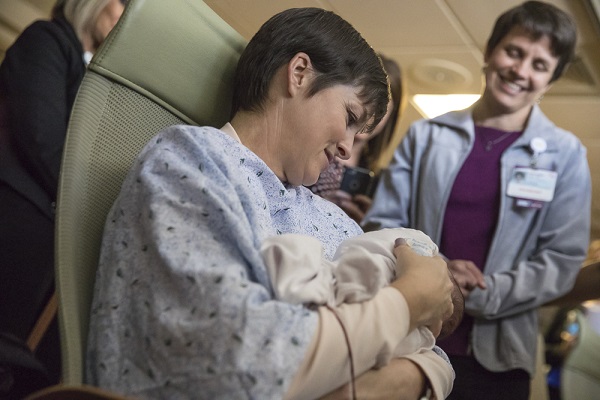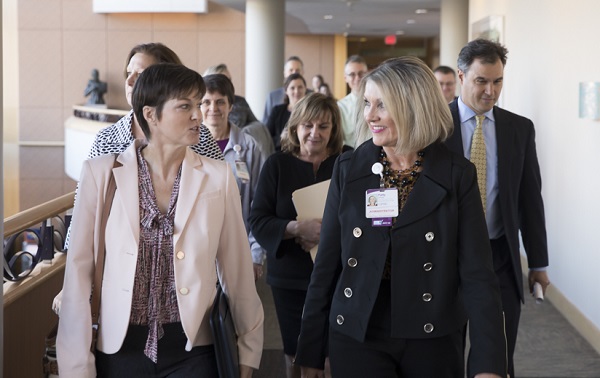
5 questions for DHS Secretary Teresa Miller on helping moms beat opioid addiction
Above photo: Teresa D. Miller, secretary of Pennsylvania’s Department of Human Services, cuddles a newborn during her visit to Magee-Women’s Hospital of UPMC. Photo courtesy of UPMC
All of us have been impacted in some way by the national opioid epidemic. Sadly, even children are feeling its effects. But thanks to its status as a healthcare hub, Pittsburgh is poised to tackle the opioid epidemic head-on.
In 2014, Magee-Womens Hospital of UPMC launched the Pregnancy Recovery Center (PRC), a first-of-its-kind, comprehensive recovery center for pregnant women with substance use disorders. The PRC integrates medication-assisted treatment (MAT) for opiate dependence with routine prenatal care and behavioral counseling. This approach—which uses buprenorphine, the “gold standard” for MAT—is improving outcomes for both mothers and babies. In fact, research suggests that pregnant women who use buprenorphine instead of methadone recover faster after delivery, and their babies experience fewer side effects.
As secretary of Pennsylvania’s Department of Human Services (DHS), Teresa D. Miller is bringing attention to opioid addiction. Before taking on the role in August, she worked as the state’s insurance commissioner and advocated for parity in mental health treatment.
We caught up with Miller after she toured the PRC and participated in a roundtable discussion on the best ways to help pregnant women and new moms who are coping with substance use disorders.

Why is it important to treat opiate addiction in pregnant women as part of their prenatal care?
The PRC is one of Pennsylvania’s Centers of Excellence, which coordinate care for people with Medicaid to address a range of healthcare needs.
One of the goals of all Centers of Excellence is to treat the whole person by integrating physical and behavioral healthcare. When you only focus on the addiction without addressing the underlying physical or mental health issues, the likelihood of keeping someone on a sustained path to recovery is really low. The PRC uses a team-based approach that includes professionals who help women with their physical and behavioral health needs, as well as social workers and peer navigators who help put new mothers on the road to recovery.
The staff really helps to ensure that people with opioid-related substance abuse disorders are supported in their communities. They keep them engaged in treatment by expanding access to MAT and coordinating with other treatment providers, social services or the criminal justice system.
How is the PRC improving women’s access to treatment?
The PRC recently expanded to include sites in Butler, Clairton, Beaver, Natrona Heights and Monroeville with grant funding from the DHS.
To describe the PRC model, I like to envision a wheel with a hub at the center and spokes radiating outward. With Centers of Excellence serving as central hubs, satellite locations help expand their reach to communities that are many miles away, ensuring that location is not a barrier to treatment.
How do “baby cuddlers” help newborns who are experiencing withdrawal?
During my tour, I got to meet with one woman who volunteers with Magee’s cuddler program. She visits for about three hours, twice a week. Some of the babies need medication to ease withdrawal symptoms, but Magee staff tells me that the cuddling alone has a positive impact.
I also got to cuddle one of the babies and speak with her mom about her recovery. I have a 19-month-old myself, but it’s been a while since I’ve held a baby that small. It’s a truly amazing experience. All your cares and worries go out the window because you’re just looking at this tiny new life.
What other features of the PRC impressed you?
I toured the center and spoke to doctors, but was most impressed by the feedback I heard directly from the women – they couldn’t say enough good things! The women seem to really appreciate that the PRC operates from a space of non-judgment. The team’s number one goal is to help women answer the question: “What can we do to help you succeed in your recovery?” Some nurses will have coffee with the new moms on their days off. Little things like that show they care about the women as individuals.
The message I heard over and over is that women enrolled in the PRC didn’t feel the stigma. Many of them described the experience as having “warm, welcoming arms around them.”
What did you learn from the roundtable discussion about ways to help mothers in recovery?
The panel featured several medical professionals from Magee. We talked about a lot of exciting ideas for the future of the PRC and Centers of Excellence throughout the state. The discussion addressed federal regulations, funding, and ways to continue improving services.
For example, keeping babies in the rooms with their mothers after birth creates more opportunities for bonding and offers access to medical staff. We also talked about ways to address social determinants of health—housing, food, transportation and more—to ensure that services are accessible.
It’s really important to Governor Wolf and the professionals who are working with this population to make sure that consumers are receiving the care they deserve. Addiction affects so many people – if not us, then someone we know or love. We want to continue breaking down stigma so we can help people who need help.
To learn more about the PRC, call 412-641-1211.